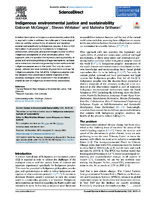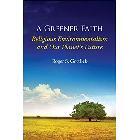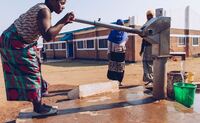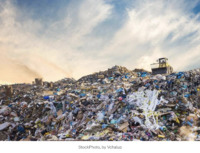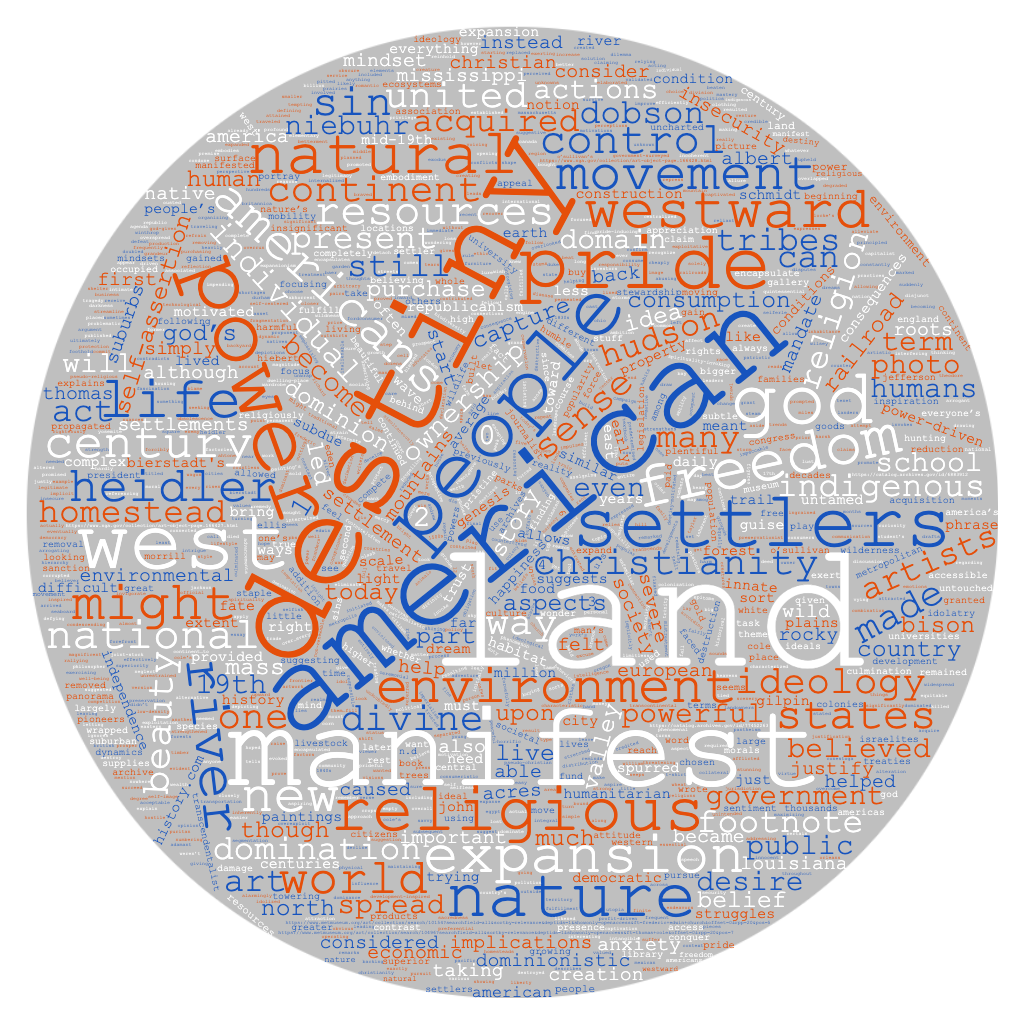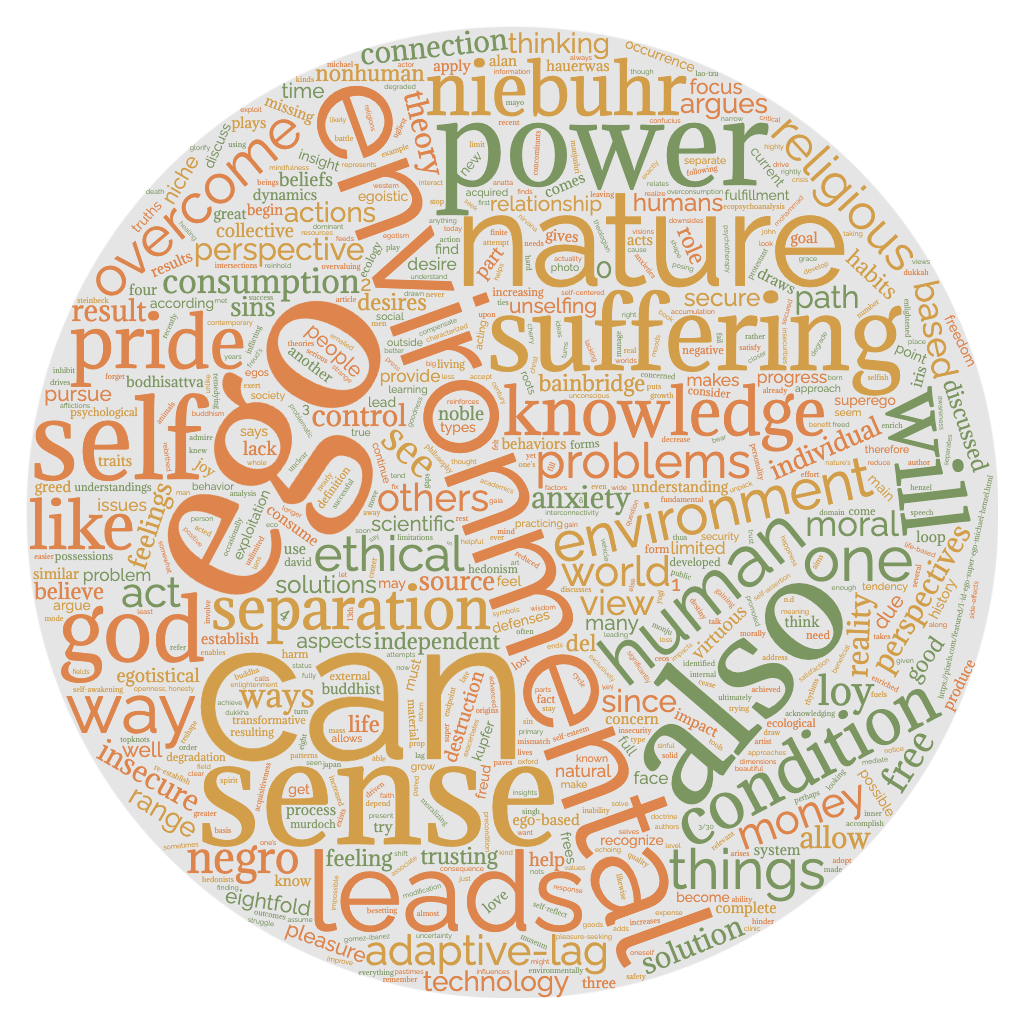Search
109 items
-
Green Umbrella Impact Team: Faith Communities Go Green
MISSION: Partnering with religious communities to create a more sustainable and equitable future for all by mobilizing their moral voice to reduce the risk of catastrophic climate change.
VISION: Religious communities collaborating to integrate care for creation in their lives and society. -
Ecological Consciousness in Jainism: Exploring Realities, Constraints, and Traditions
This paper explores the traditions and philosophies of Jainism and how that influences its connection to the environment. The author explains the Jainism cosmology and the distinction between different senses as they apply to animate and inanimate beings. Jain literature understands human connections to the world with an emphasis on the interconnectedness of life forms. To Jains, environmental concerns cannot be separated from socio-economic concerns. -
The Story of Stuff (Documentary)
The Story of Stuff is a short animated documentary about the lifecycle of material goods. The documentary is critical of excessive consumerism and promotes sustainability.
Filmmaker Annie Leonard wrote and narrated the film, which was funded by Tides Foundation, Funders Workgroup for Sustainable Production and Consumption, Free Range Studios and other foundations. Free Range Studios also produced the documentary, which was first launched online on December 4, 2007.
The documentary is used in elementary schools, arts programs, and economics classes as well as places of worship and corporate sustainability trainings. By February 2009, it had been seen in 228 countries and territories. According to the Los Angeles Times as of July 2010, the film had been translated into 15 languages and had been viewed by over 12 million people. -
The Story of Stuff Project
The Story of Stuff Project is:
Community-Minded
Our global, online Community of over 1 million Changemakers includes parents, community leaders, teachers and students, people of faith, entrepreneurs, scientists and others interested in creating a more healthy and just world. The interests and needs of our Community members deeply informs our work, and your passion and support enable our small team to have an outsized impact.
Solutions-Focused
We know all about the problems — from climate change to income inequality to political corruption. Our movies and other media focus instead on the big, exciting innovations driving the environmental and social change we need, as well as the little things individuals and communities can do to make a difference. We call it ‘Growing Solutions’.
Action-Oriented
We believe that dramatically increasing civic participation — not just refining our consumer choices — is the key to unlocking the profound challenges we face. Our four-week Citizen Muscle Boot Camp program equips participants with the basic skills they need to organize and lead a local project. And our campaigns provide diverse, engaging opportunities for our Community members to get involved, from the global level down to where they live and work. -
Patagonia's Environmental Activism Page
From mission statements to multimedia resources to annual reports, this page displays projects essential to Patagonia's sustainability efforts as a business as well as an environmentalist community. The site can serve as an inspiration template for organizations and businesses when seeking ideas for storytelling and communications with a wider audience. -
Indigenous environmental justice and sustainability
Current Opinion in Environmental Sustainability
Volume 43, April 2020, Pages 35-40 -
Sacred Watersheds and the Fate of the Village Body Politic in Tibetan and Han Communities Under China’s Ecological Civilization
Coggins studies the spiritual ecologies of Tibetan and Han communities in the People's Republic of China. The Tibetan animism focuses on the protection of landscapes because of their relation to various deities and spirits. Han communities worked on creating fengshui forests to find balance a balance of qi in all things. -
Interfaith Rainforest Initiative (IRI) Campaign Videos
The Interfaith Rainforest Initiative (IRI) creates artistic and well-produced videos that accompany their programs on climate change education and awareness-raising in branch offices around the world.
These videos are great resources for those looking for multimedia inspirations that amplify sustainability communications efforts. -
Sustainable Consumption Research and Action Initiative (SCORAI)
The Sustainable Consumption Research and Action Initiative (SCORAI) is a knowledge network of professionals working at the interface of material consumption, human well-being, and technological and cultural change. We aim to foster a transition beyond the currently dominant consumer society. SCORAI provides a forum for scholars and practitioners striving to understand the drivers of the consumerist economy in affluent technological societies; to formulate and analyze options for post-consumerist lifestyles, social institutions, and economic systems; and to provide the knowledge for emergent grassroots innovations, social movements, and public policies. -
Should Rivers Have Right? A Growing Movement Says It’s About Time
“Should Rivers Have Rights?," published through the Yale School of Environment, addresses not only the growing impact of river degradation but also the spiritual connection that indigenous cultures have with river systems around the world. Attributing legal rights to rivers and other bodies of water will contribute to their protection from further human pollution as well as restoration of these natural areas. Through legal policy, rivers can be brought back to a safe state of equilibrium while also being preserved for indigenous groups. -
A Greener Faith: Religious Environmentalism and Our Planet's Future
Roger S. Gottlieb outlines principles of religious environmentalism and its implications for social and political issues. Gottlieb addresses issues of consumerism and fundamentalism while offering the perspective of religious environmentalism to guide how we should treat other beings. Through these discussions, Gottlieb proposes his dream for the future of our world. -
American Jewish World Service- Land, Water, and Climate Justice: Story Collection
The American Jewish World Service compiled a website of their outreach stories from the US, Africa, Asia, Latin America, and the Caribbean. Reflections from work with Indigenous communities are included as well. The environmental activism showcased on their website also defend women and their crucial involvement with agriculture and the environment. From the website;
"We aid communities and movements organizing to protect the land, water and natural resources that people depend on for their survival".
More information on how to get involved is listed on their website. -
Quench Their Thirst
"Welcome to the Quench Their Thirst Fundraising Project!
Water is a basic necessity of life, yet millions of people around the world lack access to this essential resource. By setting up a fundraising page, you can make a difference and help quench the thirst of those who need it most.
The money you raise will build water wells, boreholes and water filtration plants in rural communities in Africa and Asia, where people currently have no choice but to walk for miles to collect dirty, contaminated water. This not only puts their health at risk, but also takes up valuable time that could be spent on education, work, or caring for family members." -
Saving India’s Rivers: Ecology, Civil Society, Religion, and Legal Personhood
"Abstract: In recent decades, India’s environment has been severely compromised by riverine pollution combined with large-scale dams and exacerbated by diversion for irrigation. Most prominent among the rivers so affected has been the Ganges and its tributaries in northern India, which for Hindus include the country’s most sacred bodies of water. This paper examines three campaigns opposing dam construction, arguably the most widely publicized and analyzed efforts of this kind since independence in 1947. One campaign was essentially secular with virtually no religious component, the second mostly secular with some religious support, and the third almost totally a religious initiative. In the end, only the third attained any real success, and that rested on circumstances unlikely to be replicated. The possibility that future campaigns of this scale can be taken up again appears remote. Meanwhile, riverine pollution has continued to increase everywhere despite massive governmental programs to reduce it. Theoretically, it would seem that environmentalists and Hindu devotees with their veneration of nature should be able to work in common cause to reduce pollution, but any large-scale cooperation seems unlikely between these two disparate realms. More recently an effort to protect rivers by endowing them with legal personhood enjoyed an initial success, holding the promise that lawsuits could be brought on behalf of a river against those polluting it. The paper concludes that while the legal personhood strategy is currently stalled, it offers the best chance for eventual success in attenuating riverine pollution. In the course of the paper, a comparative theoretical framework for assessing anti-dam protests will be tested." -
Environmental Sustainability in Islam
"Islamic beliefs, traditions and values provide an effective and comprehensive solution to the current environmental challenges faced by the human race. Islam has a rich tradition of highlighting the importance of environmental protection and conservation of natural resources. According to Islamic law, the basic elements of nature – land, water, fire, forest, and light – belong to all living things, not just human beings.
The Holy Qur’an and Sunnah are a guiding light to promote sustainable development in Islamic countries as well as around the world. Allah (Subhanahu Wa Ta’ala) commands human beings to avoid doing mischief and wasting resources as these acts cause degradation of the environment. The privilege to exploit natural resources was given to the mankind on a guardianship basis, which implies the right to use another person’s property on the promise that it will not be damaged or destroyed." -
Stop getting your modest clothes from fast fashion brands
"The hijab and modest fashion are not immune from the global mainstream shift to fast fashion. Ironically, in light of celebrating diversity and inclusivity, fast fashion businesses have created new niches for underserved audiences, including the Muslim community. Often these businesses outsource production to Muslim majority countries in the Global South. Here garment workers are exploited for less than a living wage..." -
Its promised land drying, Mormon Church works to save the Great Salt Lake
Due to overuse and climate change, the Great Salt Lake is drying and is estimated to disappear in about five years. In response to this, the Mormon Church of Jesus Christ of Latter Day Saints has started public conservation and water-saving efforts. This article describes these efforts and the role of the Great Salt Lake in the local environment and culture. -
Household Carbon Footprint Calculator
This interactive resource allows the user to input information on their housing situation and energy usage to calculate their estimated carbon footprint. It can show you where the most waste is and any possible ways to reduce the carbon footprint. -
Manifest Destiny: The American Dream or an Ecological Crisis?
This chapter from the student-written book "Emerging Perspectives on Religion and Environmental Values in America" explores the history of colonial expansion and the concept of manifest destiny in the US. It examines the environmental impacts as well as the religious motivations behind this course of action. Below is the first paragraph of the chapter to introduce the discussion.
"A quintessential part of the “American dream” is freedom. Whether it be freedom of religion, freedom of speech, or simply freedom to pursue one’s own dreams, Americans have always idolized the United States as a sort of utopia for individual freedom. 'Manifest destiny' is a mindset that embodies this belief. A staple term in every elementary, middle, and high school student’s American history textbook, it might be considered the epitome of what it meant to be American at the start of American imperialism. The idea of manifest destiny gained popularity in the mid-19th century and was built upon the notion of freedom. Advocates for manifest destiny believed that Americans were free, even bound by fate, to conquer the North American continent and expand the realm of democratic republicanism and Christianity. Under the guise of religious, political, and economic motivations, manifest destiny allowed Americans to pursue the 'American dream' and subdue the 'wild west.' The environmental and humanitarian implications of manifest destiny were frequently overlooked or not considered, resulting in ideology that still today seeps into our behaviors and perceptions regarding domination and superiority." -
The Consequences of the Ego and the Potential of Unselfing
This chapter from the student-written book “Emerging Perspectives on Religion and Environmental Values in America” explores consumption, human ego, and the relationship between these and our environment. It discusses human nature and how we interact with each other, technology, and nature. Below is the first paragraph of the chapter to introduce the discussion.
"Consumption is one of the favorite pastimes of our developed society, but it is also the source of many environmental problems. As technology has advanced, our society and economy have developed into one dependent on the mass consumption of things. Our habits of mass consumption have acted as a vehicle of destruction by increasing the amount of resources we use and waste we produce, leaving parts of our environment severely degraded. As a result, the people who have more and seem to be successful make more environmental impact, while the environmental consequences of their actions tend to be felt by the have nots. Our symbols of success that we prop up seem to be part of the problem as they have serious environmental downsides, and even though we recognize these downsides we continue to glorify consumptive habits that are destructive. But have you ever considered the roots of our need to consume?" -
The Intellectual Martian Society of “Stranger in a Strange Land” by Robert Heinlein
This chapter from the student-written book “Emerging Perspectives on Religion and Environmental Values in America” explores the environmental ethics and spirituality of the book Stranger in a Strange Land. Specifically, the author discusses the importance of water and the environmental impact of the book. Below is the first paragraph of the chapter to introduce the discussion.
"In 1961, the accomplished science fiction author Robert A. Heinlein shared his latest work with the world. In the fashion of a fairytale, Stranger in a Strange Land begins 'Once upon a time,' and goes on to describe the fantastic culture of Mars and its impact on human society. The timing of its publication in the early 1960s allowed for a short digestion period, so that it was ripe in the mind of the counterculture in the latter half of the decade. Themes of religious reform, free love, and a oneness with the cosmos permeate the book, and coincidentally rose to popularity during this time. The alignment of the novel with the counterculture cannot be understated: in 1967, the Freak Scene recorded a song entitled 'Grok!,' an homage to the word coined by Heinlein in Stranger in a Strange Land, and a year later the Byrds referenced water brotherhood in their song 'Triad.' The verb 'grok' even found its way into the vernacular of the counterculture (Blackmore, 1995). Messages about the sanctity of clean water and the positive potential of religion reached tens of millions, securing the legacy of Stranger in a Strange Land as one of the books which shaped religious and environmental values in the United States (Library of Congress, 2012)." -
#PlasticDetox Social Media Challenge
"Join the EARTHDAY.ORG #PlasticDetox challenge and reduce your plastic use! Take small steps to avoid single-use plastics like bags, straws, bottles, and packaging. Share your eco-friendly swaps and inspire others to join the movement on social media using #PlasticDetox.
The challenge not only focuses on individual actions but also encourages participants to spread awareness and inspire others to join the movement. By collectively engaging in the EARTHDAY.ORG #PlasticDetox challenge, participants will create a ripple effect and encourage a wider shift towards a plastic-free lifestyle. Together, we can make a big impact for a plastic-free future!" -
The Spirit of the Rillito
This article explores the ideas of animism and new animism. Animism is the belief that all things, living and non-living, have a spiritual essence. The author connects this system of beliefs to their local river, the Rillito. -
Catholic Diocese of Columbus: Creation Care Guide
The Creation Care Team of the Catholic Diocese of Columbus has created a Creation Care Guide based on the teachings of Laudato Si’. This guide contains information on energy conservation and efficiency, purchasing and recycling, transportation, and water conservation. Additionally, they have a section on making Laudato Si’ more accessible to younger generations. The inspiration for this guide came from the Archdiocese of Atlanta who wrote a document titled, An Action Plan for the Roman Catholic Archdiocese of Atlanta. -
Mid-Winter Stroll on a Pier
"A mid-winter stroll on a pier in beautiful Lake Erie. This lake is the most valued fishery in all of the Great Lakes. Keeping this lake clean is important for the human and non-human residents that depend on this water source. A resource that sustains all life." Taken by Gabriel Sanchez. Submitted to the RESTORExchange Sustainability Photo Contest.






